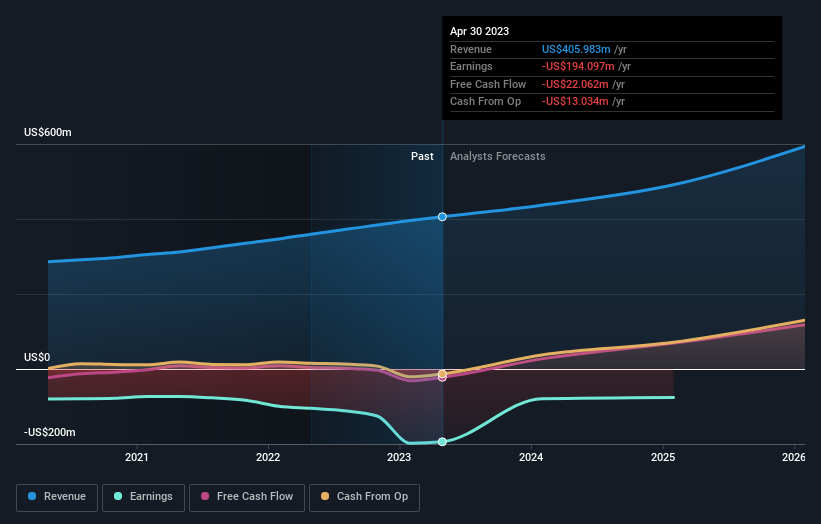Institutional shareholders may be less affected by Zuora, Inc.'s (NYSE:ZUO) pullback last week after a year of 9.7% returns
Key Insights
Institutions' substantial holdings in Zuora implies that they have significant influence over the company's share price
The top 14 shareholders own 51% of the company
Using data from analyst forecasts alongside ownership research, one can better assess the future performance of a company
A look at the shareholders of Zuora, Inc. (NYSE:ZUO) can tell us which group is most powerful. With 67% stake, institutions possess the maximum shares in the company. Put another way, the group faces the maximum upside potential (or downside risk).
Losing money on investments is something no shareholder enjoys, least of all institutional investors who saw their holdings value drop by 4.5% last week. However, the 9.7% one-year return to shareholders might have softened the blow. But they would probably be wary of future losses.
Let's take a closer look to see what the different types of shareholders can tell us about Zuora.
View our latest analysis for Zuora
What Does The Institutional Ownership Tell Us About Zuora?
Institutional investors commonly compare their own returns to the returns of a commonly followed index. So they generally do consider buying larger companies that are included in the relevant benchmark index.
We can see that Zuora does have institutional investors; and they hold a good portion of the company's stock. This implies the analysts working for those institutions have looked at the stock and they like it. But just like anyone else, they could be wrong. When multiple institutions own a stock, there's always a risk that they are in a 'crowded trade'. When such a trade goes wrong, multiple parties may compete to sell stock fast. This risk is higher in a company without a history of growth. You can see Zuora's historic earnings and revenue below, but keep in mind there's always more to the story.
Since institutional investors own more than half the issued stock, the board will likely have to pay attention to their preferences. It would appear that 5.3% of Zuora shares are controlled by hedge funds. That catches my attention because hedge funds sometimes try to influence management, or bring about changes that will create near term value for shareholders. The company's largest shareholder is The Vanguard Group, Inc., with ownership of 9.6%. In comparison, the second and third largest shareholders hold about 7.8% and 5.7% of the stock. Tien Tzuo, who is the third-largest shareholder, also happens to hold the title of Chairman of the Board.
Looking at the shareholder registry, we can see that 51% of the ownership is controlled by the top 14 shareholders, meaning that no single shareholder has a majority interest in the ownership.
Researching institutional ownership is a good way to gauge and filter a stock's expected performance. The same can be achieved by studying analyst sentiments. There are a reasonable number of analysts covering the stock, so it might be useful to find out their aggregate view on the future.
Insider Ownership Of Zuora
The definition of an insider can differ slightly between different countries, but members of the board of directors always count. Company management run the business, but the CEO will answer to the board, even if he or she is a member of it.
I generally consider insider ownership to be a good thing. However, on some occasions it makes it more difficult for other shareholders to hold the board accountable for decisions.
Our most recent data indicates that insiders own some shares in Zuora, Inc.. It is a pretty big company, so it is generally a positive to see some potentially meaningful alignment. In this case, they own around US$95m worth of shares (at current prices). It is good to see this level of investment by insiders. You can check here to see if those insiders have been buying recently.
General Public Ownership
With a 21% ownership, the general public, mostly comprising of individual investors, have some degree of sway over Zuora. While this group can't necessarily call the shots, it can certainly have a real influence on how the company is run.
Next Steps:
While it is well worth considering the different groups that own a company, there are other factors that are even more important. For example, we've discovered 2 warning signs for Zuora that you should be aware of before investing here.
Ultimately the future is most important. You can access this free report on analyst forecasts for the company.
NB: Figures in this article are calculated using data from the last twelve months, which refer to the 12-month period ending on the last date of the month the financial statement is dated. This may not be consistent with full year annual report figures.
Have feedback on this article? Concerned about the content? Get in touch with us directly. Alternatively, email editorial-team (at) simplywallst.com.
This article by Simply Wall St is general in nature. We provide commentary based on historical data and analyst forecasts only using an unbiased methodology and our articles are not intended to be financial advice. It does not constitute a recommendation to buy or sell any stock, and does not take account of your objectives, or your financial situation. We aim to bring you long-term focused analysis driven by fundamental data. Note that our analysis may not factor in the latest price-sensitive company announcements or qualitative material. Simply Wall St has no position in any stocks mentioned.
Join A Paid User Research Session
You’ll receive a US$30 Amazon Gift card for 1 hour of your time while helping us build better investing tools for the individual investors like yourself. Sign up here


